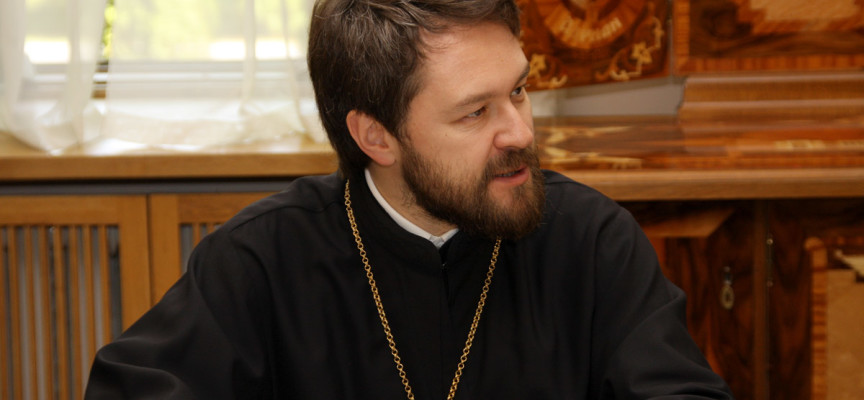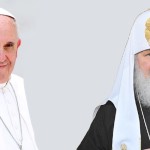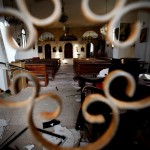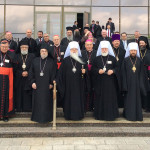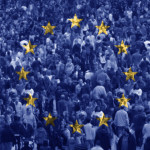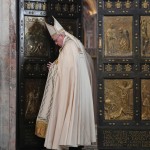No. 2 of the Moscow Patriarchate, Metropolitan Hilarion Alfeev, President of the Department of External Relations since 2009, recently took part in the works of the Synod on the family, meeting Pope emeritus Benedict XVI, the president of the Pontifical Council for Promoting Christian Unity and Pope Francis. In an interview published on the new issue of the international Jesuit monthly magazine “Popoli” (click here for the full text in Italian) , this was his answer to the inevitable question about the current relationships between Moscow and the Vatican and about the chances of an encounter between Pope Francis and Patriarch Kirill: “The recent events in Ukraine seem to bring the atmosphere back to the Nineties, while we hoped that was only a memory of the past. I mean when aggressive actions by Greek-Catholics had been a real obstacle for a smooth development of the relationship between the Russian and the Catholic Churches”. What happened was that, after the fall of the USSR and the return of religious freedom, the Holy See had reorganized the dioceses in Russia and in the other countries of the former USSR, “at times without taking into account the opinion of the Orthodox Church”, Alfeev points out.
But while in Russia the situation is now stable and the relationships with the Archbishop of Moscow, Paolo Pezzi, are regular and friendly, the situation in Ukraine is very different and the Metropolitan so describes it: “The direct participation of the Uniates in the civil conflict, their attempts to divide the Ukrainian people not only according to their political but also religious belonging, their efforts to spread discord among the followers of the Ukrainian Orthodox Church, their frequent contacts with the schismatic groups and a long series of provocations against the Patriarchate of Moscow have caused a huge damage not only to Ukraine and its people, but also to the orthodox-catholic dialogue”.
If the summit meeting between Kirill and Francis is not possible for political reasons, some steps forward have been made on the theological ground, although the question dividing Catholics and Orthodoxes is still the theme of the primacy of the universal Church, the main subject being discussed within the mixed Commission for the theological dialogue between the Orthodox Church and the Catholic Church. However, this is a very slow process, also due to the “disagreements between the Orthodox members of the Commission, about the role of the first bishop of the Universal Church”, explains Hilarion. Nevertheless, “despite the differences of opinion about the doctrine, Orthodoxes and Catholics can and must act together in many things”, because their views about ethical issues “basically coincide, as they are based on the strong grounds of the evangelical morals”.
Certainly, a threat is represented by the “dissolution, unfortunately going on, deliberate and organized in the European continent, of the system of values which the life of the European people has revolved around for centuries, and this instills serious fears about the future of Europe”. But the Russian society is facing very serious challenges too, such as the splitting of the family, “social inequality, the loss of moral leanings and the imposition of the consumerism and profit ideology through the mass media”, not to mention “alcoholism and drug abuse,” more and more widespread and devastating. All these problems could only be solved if “the reforms to improve the level and quality of life will be based on a strong spiritual and moral basis”.
Il numero due del Patriarcato di Mosca, metropolita Hilarion Alfeev, dal 2009 Presidente del Dipartimento per le relazioni esterne, è intervenuto nei giorni scorsi ai lavori del Sinodo sulla famiglia, ha incontrato il papa emerito Benedetto XVI, il presidente del Pontificio consiglio per l’unità dei cristiani e papa Francesco. In un’intervista pubblicata sull’ultimo numero del mensile internazionale dei gesuiti “Popoli” (qui il testo integrale) , alla inevitabile domanda sulla situazione delle relazioni tra Mosca e il Vaticano e sulla possibilità di un incontro tra papa Francesco e il patriarca Kirill, così ha risposto: “Gli ultimi avvenimenti in Ucraina sembrano far ritornare l’atmosfera degli anni Novanta, che speravamo fosse un ricordo del passato: quando, cioè, le azioni aggressive da parte dei greco-cattolici sono state un vero ostacolo per uno sviluppo armonioso dei rapporti tra la Chiesa russa e quella cattolica”. Era avvenuto che, dopo il crollo dell’Urss e il ritorno della libertà religiosa, la Santa Sede aveva riorganizzato le diocesi in Russia e negli altri Paesi dell’ex Urss, “a volte senza tenere in conto l’opinione della Chiesa ortodossa”, precisa Alfeev.
Mentre, però, in Russia la situazione si è stabilizzata e i rapporti con l’arcivescovo di Mosca Paolo Pezzi sono regolari e cordiali, in Ucraina la situazione è ben diversa e il Metropolita la descrive così: “La partecipazione diretta degli uniati allo scontro civile, i loro tentativi di dividere il popolo ucraino secondo l’appartenenza non solo politica, ma anche confessionale, il loro sforzo di seminare discordia tra i fedeli della Chiesa ortodossa ucraina, i loro frequenti contatti con i gruppi scismatici e una lunga serie di provocazioni nei confronti del Patriarcato di Mosca hanno recato un gravissimo danno non soltanto all’Ucraina e al suo popolo, ma anche al dialogo ortodosso-cattolico”.
Se l’incontro di vertice tra Kirill e Francesco non è possibile per questioni politiche, qualche passo avanti è avvenuto sul piano teologico, anche se la questione che divide cattolici e ortodossi rimane il tema del primato nella Chiesa universale, argomento principale in discussione nel quadro della Commissione mista per il dialogo teologico tra la Chiesa ortodossa e la Chiesa cattolica, processo che però cammina a rilento anche per le “divergenze tra i membri ortodossi della Commissione, relative al ruolo del primo vescovo della Chiesa universale”, spiega ancora Hilarion. Tuttavia, “nonostante le discordanze dal punto di vista della dottrina, ortodossi e cattolici in molte cose possono e devono agire insieme”, perché le posizioni riguardo alle questioni etiche “in sostanza coincidono, perché si basano sul fondamento solido della morale evangelica”.
Una minaccia è certo rappresentata dallo “smantellamento, purtroppo in corso nel continente europeo, voluto e organizzato, del sistema di valori attorno a cui per secoli si è costruita la vita degli europei, e questo fatto infonde seri timori per il futuro dell’Europa”. Gravata da sfide molto serie è anche la società russa, con lo sgretolamento della famiglia, “la disuguaglianza sociale, la perdita degli orientamenti morali, l’imposizione dell’ideologia del consumo e del profitto attraverso i mass media” e poi “alcolismo e tossicodipendenza” sempre più diffusi e devastanti, tutti problemi che potranno essere risolti solo se “le riforme volte a migliorare il livello e la qualità della vita saranno basate su una solida base spirituale e morale”.
Sarah Numico
Latest posts by Sarah Numico (see all)
- Neither lecturers nor teachers, but witnesses - 25 aprile 2015
- Holy Week with the persecuted - 30 marzo 2015
- They choose “to be in it” - 23 marzo 2015

